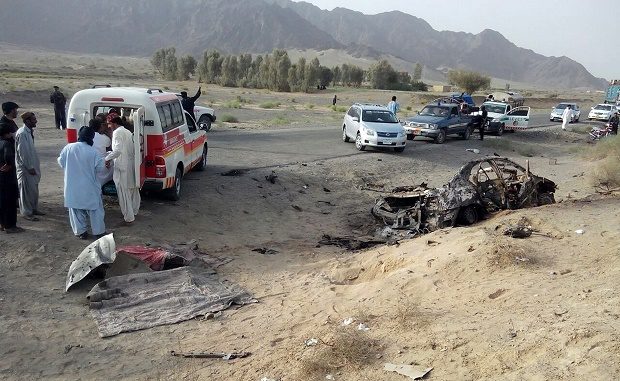
This photo taken by freelance photographer Abdul Malik on Saturday, May 21, 2016, purports to show volunteers standing near the wreckage of the destroyed vehicle, in which Mullah Mohammad Akhtar Mansour was allegedly traveling in the Ahmed Wal area in Baluchistan province of Pakistan, near the Afghanistan border. A senior commander of the Afghan Taliban confirmed on Sunday that Mansour, the extremist group’s leader, has been killed in a U.S. drone strike. AP
QUETTA, Pakistan — Taliban supremo Mullah Akhtar Mansour was killed in a US drone attack in Pakistan, senior militant sources told AFP Sunday, adding that an insurgent assembly was underway to decide on his successor.
Saturday’s bombing raid, the first known US assault on a top Afghan Taliban leader on Pakistani soil, marks a major blow to the militant movement which saw a new resurgence under Mansour.
READ: Taliban leader Mansour ‘likely killed’ in US drone strike | ‘The city was once again back in the hands of the Taliban’
The elimination of Mansour, who rose to the rank of leader nine months earlier after a bitter internal leadership struggle, could also scupper any immediate prospect of peace talks.
“I can say with good authority that Mullah Mansour is no more,” a senior Taliban source told AFP.
Mansour’s death, which risks igniting new succession battles within the fractious group, was confirmed by two other senior figures who said its top leaders were gathering in Quetta to name their future chief.
The Taliban sources said that Sirajuddin Haqqani, leader of the dreaded Haqqani network and one of Mansour’s deputies, was among the frontrunners, adding that Mullah Abdul Ghani Baradar was also in contention.
Both figures are said to be close to the Pakistani military establishment, which has historically nurtured and supported the Taliban.
Mullah Yakoub, the son of the group’s deceased founder Mullah Omar, is also favored by many Taliban commanders for the leader’s post.
It is unclear when Mansour’s successor will be announced. The Taliban have not commented officially on Mansour’s death or the leadership succession.
US officials had said they had no definitive proof of his death in multiple drone strikes, authorized by President Barack Obama, in the remote Pakistani town of Ahmad Wal in Balochistan province.
But both Afghanistan’s main spy agency, and the country’s Chief Executive Abdullah Abdullah, asserted that Mansour had been killed in the attack.
“Mansour was being closely monitored for a while… until he was targeted along with other fighters aboard a vehicle,” Afghanistan’s National Directorate of Security said in a statement.
Pakistan on Sunday lambasted the US over the drone attack, calling it a violation of its sovereignty and asserting that information about it was shared with its prime minister and army chief only after the raid.
Pakistani security officials said they recovered two bodies charred beyond recognition from a smoldering vehicle at the scene of the attack.
The passenger, suspected to have been Mansour, was said to be returning from Iran and was using a Pakistani passport in the name of Muhammad Wali.
The driver — who also died in Saturday’s attack — was a civilian who worked for a local car rental company, according to the officials, contradicting the US account that he was a “second combatant”.
‘Imminent threat’
Mansour was formally appointed head of the Taliban in July last year following the revelation that Mullah Omar had been dead for two years.
The group saw striking military victories under the firebrand supremo, helping to cement his authority by burnishing his credentials as a commander.
The Taliban briefly captured the strategic northern city of Kunduz last September in their most spectacular victory since they were toppled from power in 2001.
The southern opium-rich province of Helmand is also almost entirely under insurgent control.
“Mansour posed… an imminent threat to US personnel, Afghan civilians and Afghan security forces,” US Secretary of State John Kerry said during a visit to Myanmar Sunday.
“He was also directly opposed to peace negotiations.”
But Mansour’s death was not immediately seen as likely to push the Taliban closer to peace talks. It could press them to show they are still able to wage an aggressive battle, observers say.
“The war has been going on for so long, the Taliban has so many leaders and so much ability to function at the local level even without strong central guidance, that we would be well advised to keep expectations in check,” said Michael O’Hanlon of the Brookings Institution think-tank.
The drone attack came just days after representatives from the US, China, Pakistan and Afghanistan held another round of negotiations in Islamabad aimed at reviving long-stalled direct peace talks between the Afghan government and the Taliban.
However pressure has been building in recent months for the United States to return to direct attacks on the Taliban, particularly via air strikes.
NATO ended its combat mission in Afghanistan in December 2014, pulling out the bulk of its troops, although a 13,000-strong residual force remains for training and counterterrorism operations.
The Taliban, who announced the start of their annual spring offensive last month, have already stepped up their campaign against the Western-backed Kabul government for the season.